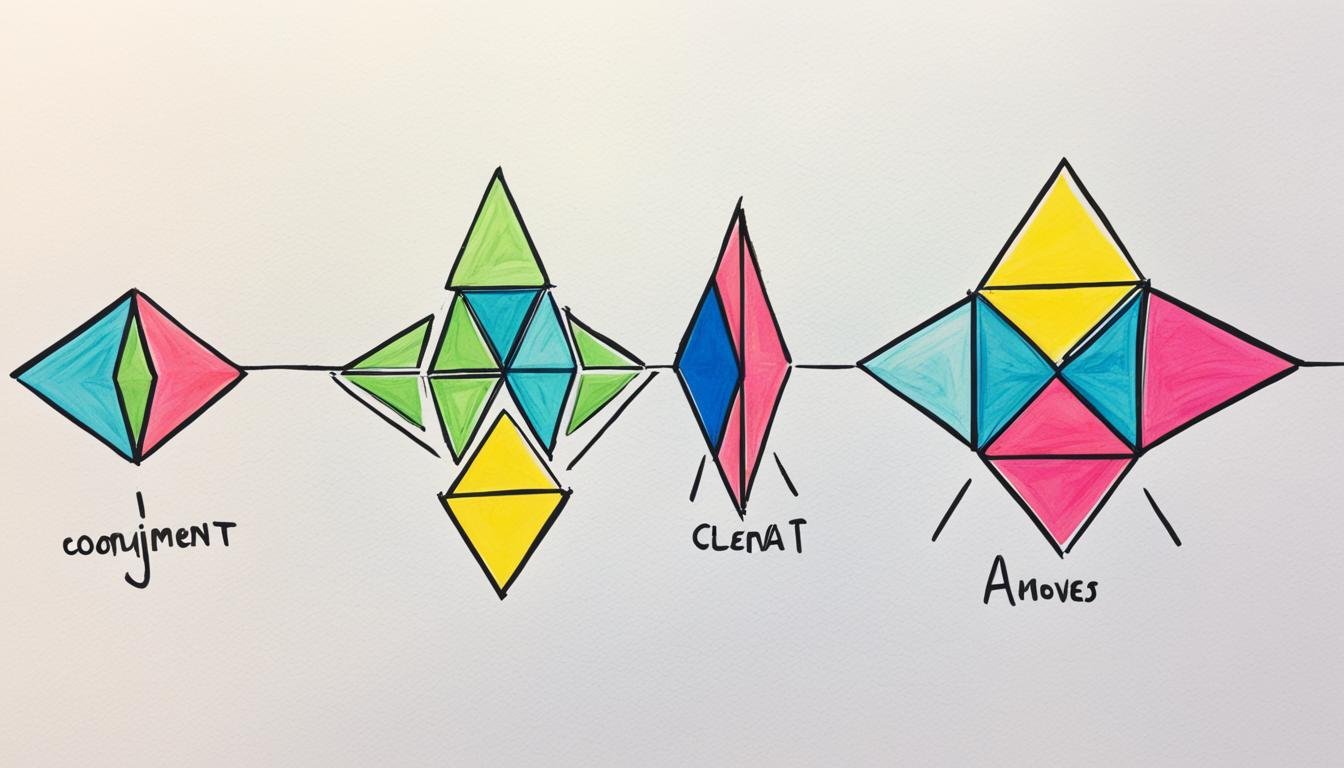Living with Integrity: Aligning Actions with Values and Principles
Mahatma Gandhi once said, “A person is said to have integrity when their actions align with their beliefs.” Living with integrity is about making choices that match our values and principles. This is true even when it’s hard or tempting to do otherwise. It requires behaving ethically, being honest, taking responsibility, and knowing ourselves.
Key Takeaways:
- Living with integrity involves aligning actions with values and principles.
- It means behaving ethically, being honest, taking responsibility, and knowing yourself.
- Mahatma Gandhi stressed the role of integrity in building character.
- Living this way helps us grow and makes society more peaceful.
- With careful decisions and reflecting on our actions, we can shape a life of integrity.
Understanding Integrity and Its Significance
Integrity means living by strong moral principles. It’s more than following rules. It’s about acting in ways that match our deepest beliefs. When our actions reflect our values, there’s peace in our hearts.
In personal and work life, integrity is key. It helps us build trust with others. By always choosing what’s right and valuing honesty, we make meaningful relationships. This brings joy and helps us feel like we belong.
At work, integrity is highly respected. Companies want honest, dependable workers. Being true to our values creates a positive environment and builds trust with coworkers. It shows we can be counted on.
“Integrity is doing the right thing, even when no one is watching.” – C.S. Lewis
Integrity guides us in tough choices. When ethics come into play, those true to their values can find their way. They choose paths of honesty and fairness. This builds accountability and shows who we really are.
The Importance of Ethical Principles and Moral Values
Ethical principles help us know what’s right and what’s wrong. They are the core of our personal and community values. With honesty, kindness, and fairness at our core, we help build a better world.
Moral values shape our choices. They are based on our backgrounds. Living with integrity means our actions reflect these important values.
Grasping integrity’s meaning is a big first step. It leads to a life rich in good choices and strong values. Next, we’ll look at how self-awareness and daily practices help us live with integrity.
The Pillars of Integrity: Honesty and Truthfulness
In our world, we often face tough ethical choices. Living with integrity means having strong bases that guide us. Honesty and truthfulness are key. Honesty means always being real and open. Truthfulness is more than telling the truth. It’s about making sure our words match our thoughts, keeping it real.
Being honest and truthful helps us build trust. This is true in both our personal and work relationships. When we are straightforward and act in good faith, we create a space where others feel safe. They know they can count on us. By telling the truth, we show others we value them. This builds deeper, more meaningful relationships.
“Integrity is telling myself the truth. And honesty is telling the truth to other people.” – Spencer Johnson
Integrity also means being true to who we are. It’s about being honest with ourselves. When we’re real about our strengths and areas we need to improve, we grow. Honesty lets us face our faults without feeling bad. This helps us learn and get better all the time.
Living truthfully and honestly lets us match our choices with what we believe in. This way, we can face any challenge with our heads held high. In a society that loves truth and openness, being honest and true brings us joy. It also helps everyone around us see the goodness in living with integrity.
Accountability and Responsibility: Key Components of Integrity
In the journey of living with integrity, accountability and responsibility are key. They help us own our actions and understand how they affect others. This leads to better relationships, personal growth, and ethical choices.
Accountability is about more than just knowing the results of our choices. It’s being ready to face both the good and bad outcomes of what we do. When we accept accountability, we show integrity by matching our actions with our values.
Responsibility means meeting our duties and promises. It’s knowing our actions affect others and then trying to act in ways that build trust and fairness.
Prioritizing accountability and responsibility builds trust in relationships. It shows others they can rely on us to keep our word and act ethically. This helps create a space where people communicate openly and work together well.
Accountability and responsibility also help us grow. By admitting our errors and learning from them, we get better. This process of self-improvement is crucial for integrity.
Brené Brown once said, “Integrity is choosing courage over comfort” and “choosing to practice our values.” By choosing accountability and responsibility, we improve our character and live true to our beliefs.
“Accountability and responsibility are not just about doing the right thing; they are about being the kind of person you want to be and living a life of integrity.”
To live with integrity, we must value accountability and responsibility in our character. These traits support our relationships, growth, and help us face life’s tests with bravery.
Cultivating Courage and Resilience
Living with integrity means matching our actions with what we believe. It’s also about having courage and resilience. These help us stay honest with ourselves, even when things get tough.
Courage faces our fears and tough situations. Resilience helps us get back up after a fall and become stronger from hard times. These traits support our integrity by giving us the power to stay true to our values, even when it’s hard.
“Courage is not the absence of fear, but rather the judgment that something else is more important than fear.” – Ambrose Redmoon
Cultivating courage means living by what we deeply feel, even when it’s tough. It involves making choices that match our heart, not what others expect. It takes guts to stand firm, speak openly, and live by our principles, especially when others don’t agree.
Resilience helps us get through tough times and come out stronger. It turns challenges into chances to get better. Being resilient means learning from our mistakes, adapting to change, and not giving up on our dreams, even when they seem out of reach.
Building Resilience:
- Cultivate a growth mindset: Embrace challenges as opportunities for growth and believe in your ability to learn and improve.
- Develop a strong support system: Surround yourself with positive and supportive individuals who can provide guidance and encouragement during difficult times.
- Practice self-care: Prioritize your physical, mental, and emotional well-being to maintain resilience and prevent burnout.
- Learn from setbacks: Reflect on past failures or setbacks, identify lessons learned, and use them as stepping stones for personal and professional growth.
By being both courageous and resilient, we don’t just live well. We also grow as people and become better versions of ourselves. These traits let us deal with life’s challenges gracefully, keep our true selves, and move forward with our values as our guide.
The Role of Self-Awareness in Living with Integrity
Self-awareness is key to living with integrity. It lets us truly know our values, strengths, and limits. This deep understanding helps us make choices that match our moral views. We’ll dive into how self-awareness aids self-reflection, growth, and living with integrity.
Looking within is crucial. When we reflect on our thoughts and behaviors, we see our true motivations. This insight points out any differences between our actions and what we believe. It guides us to live consistently with our values.
Being aware means understanding how our choices affect us and those around us. We know our decisions have results, so we own up to them. This helps us make choices that fit with what we truly value.
“Integrity is the alignment of our actions with our innermost values.”
Self-awareness also leads to personal growth. It shows us where we need to grow and become better. Knowing our limits helps us improve. This growth keeps us in step with our changing values, boosting our integrity.
The power of self-awareness lies in its ability to provide us with the clarity and consciousness needed to live with integrity. It allows us to navigate moral dilemmas, make ethical decisions, and maintain consistency between our values and actions.
Next, we’ll look at personal growth and how it’s tied to living with integrity. It’s about an ongoing effort to keep our choices in line with our values.
The Journey to Personal Growth
Living with integrity is a journey, not a stop. It’s about growing and improving yourself every day. When we match what we do with what we believe, we open the doors to grow and change. Doing this helps us become the best we can be.
To start this journey, we must use strategies for growth every day. Reflecting on ourselves is key. It helps us see where we’re strong and where we can do better. This way, we can recognize our progress and fix what we need to as we go.
Connecting with the right people is also very important. Being around those who have similar values helps us. They offer us support and push us to be better. Talking openly and getting feedback from them is valuable. It moves us closer to our goals and helps us deal with hard times.
Trying new things and welcoming change are also important. Stepping out of what feels safe helps us learn and see things differently. Risking a little and facing things we’re unsure about can show us new ways. It can also help us realize abilities we didn’t know we had.
The journey to personal growth can be tough. It asks for bravery and a strong will to face what scares us. But each time we move forward, we get better. We learn to lead a life full of honesty and strength.
Sparking positive change is a big part of growing personally. When we act with integrity, we inspire those around us. This might mean supporting causes we believe in or showing through our actions what’s right. In these ways, we can really make a difference that lasts.
As we grow personally, we should keep in mind that it’s not a one-time thing. It’s a commitment for life. It needs us to look inside, have self-control, and be ready to change. By growing, we can have a life that’s meaningful. We’ll also build deep connections with ourselves and others.
Nurturing Personal Growth: Strategies and Practices
To actively foster personal growth and live with integrity:
- Set goals and create a vision for the kind of person you aspire to be.
- Practice self-care and prioritize your physical, mental, and emotional well-being.
- Seek out opportunities for learning and self-improvement through courses, workshops, books, or mentors.
- Cultivate gratitude and celebrate your achievements, no matter how small.
- Take ownership of your decisions and actions, accepting responsibility for their consequences.
- Surround yourself with a supportive network of individuals who share your values.
- Embrace feedback and view it as an opportunity for growth and improvement.
- Find ways to give back to your community and contribute to a greater cause.
- Practice self-reflection regularly to stay in touch with your values and make necessary adjustments.
Remember, personal growth is a lifelong journey. Each day offers a chance to grow, learn, and live by your beliefs. Enjoy the trip and unlock all you can be.
Applying Integrity in Daily Life
Living with integrity goes beyond knowing what’s right and wrong. It’s about choosing to do the right thing in our daily actions. This helps us grow and lead a life full of meaning.
At work, integrity makes a big difference. Showing ethical behavior and respect builds trust. It helps us grow professionally in a positive, respectful workplace.
In our personal lives, integrity is key for strong relationships. This involves being honest, doing what we say, and showing respect. It helps deepen our bonds with others.
Integrity is crucial in decision-making too. It means thinking about how our choices affect us and those around us. Even when faced with tough decisions, staying true to our values is important for our growth and character.
Integrity is not about perfection; it’s about consistency. It’s about striving to do the right thing, even when it’s challenging or inconvenient. It’s a commitment to living in alignment with our values, day in and day out.
Personal growth and integrity go hand in hand. By reflecting on ourselves and staying open to learning, we become our best selves. Integrity means always seeking to improve and learn from life’s lessons. This journey not only betters our life, but it also inspires those around us.
Living with integrity is an everyday choice. It calls for us to stick to our values and grow personally. By living ethically and with great character, we make our world a better place for all.
Overcoming Challenges and Temptations
Living with integrity means we encounter many challenges and temptations. These can test our commitment to our values. It’s key to have courage and resilience. These qualities help us stay honest and make good choices.
Courage is vital for integrity. It lets us face tough times and stand up for what’s right. It also helps us meet hard outcomes with strength. Making choices that match our morals helps us tackle any problems that come our way.
Resilience is just as important. It allows us to recover from setbacks and learn from mistakes. It helps us stick to acting ethically. This makes it easier to resist temptations and pressure, keeping our integrity strong.
“Integrity is not a given, it is a choice you make every day. It requires courage to resist temptation and resilience to navigate challenges, but the rewards of living with integrity are immeasurable.” – Jane Williams
To keep our integrity facing tough choices, we need to come up with good plans. Here are some tips to help us stay true to our values:
-
Strengthen your self-awareness: Know your values and what you stand for. This helps you keep true to your beliefs, even when it’s hard.
-
Seek support from like-minded individuals: Surround yourself with those who value honesty. They can help you, encourage you, and keep you on track.
-
Think ahead: Imagine challenges or temptations that might occur. By planning, you can find ways to face them without losing your values.
-
Practice self-reflection: Think about your choices and see if they fit with your values. This can help you correct any mistakes and do better next time.
Imagine a mountaineer on tough ground. They aim for the top, even when paths are hard or shortcuts appear. In the same way, sticking to our values takes courage and resilience. This takes us on a journey of integrity and growth.
Navigating Ethical Dilemmas
Facing ethical dilemmas, it’s good to seek advice from those who are wise and care. Use ethical codes or principles to help decide well. These frameworks guide us to act with integrity in our own lives and in the eyes of others.
Nurturing Integrity in Society
In our efforts to live with integrity, we must see how our actions affect society. Being honest, accountable, and ethical helps us grow personally. It also makes the world a better place.
Integrity is vital for a peaceful society. When we are true to ourselves and follow ethical rules, we inspire others. This creates a positive effect that goes beyond just our personal lives.
Communities, businesses, and groups help promote integrity. They can do this by making sure their ways are fair, transparent, and ethical. This creates an atmosphere where integrity can flourish.
Government, business, and non-profit leaders have a big part in this. They should lead with ethical actions. This inspires others to behave ethically too. Strong ethical leadership builds trust and helps everyone grow.
Teaching about integrity is also crucial. This helps people make the right ethical choices. It also empowers them to face tricky ethical situations by staying true to their values.
Ways to Promote Integrity in Society
To build a society that values integrity, try these ideas:
- Start campaigns to raise integrity awareness. Share why integrity is important for everyone.
- Work with schools and colleges to include integrity in their lessons. This gives students a solid ethical base.
- In businesses and groups, put in codes of conduct and ways to report wrongdoing safely. This promotes ethical acts within these groups.
- Always highlight and praise people and groups that show remarkable integrity. This encourages others to act similarly.
- Get involved in community work. This not only helps you grow but also instills a sense of duty and integrity.
“Integrity is not an option, it’s a responsibility to ourselves and society.” – Unknown
Living with integrity isn’t just about what one person can do. It’s about all of us working together. Together, we can make a society full of trust, fairness, and ethical values. By promoting integrity in our communities and groups, we help make the world a more just and peaceful place.
Conclusion
Living with integrity means always doing what your values say is right. It’s about choosing to be truthful, taking blame for mistakes, and always trying to grow. When we do this every day, we get stronger as people and make the world a better place.
It helps us be true to who we are. When we live this way, others see and learn from our good choices. We inspire them to be better, too. This way of living gives us the power to stay true to what we believe in.
Choosing integrity is a tough, but fulfilling, journey. There will be hard times, but staying strong and true to yourself can help you get through anything. Remember, always living by what you know is right is worth it.








